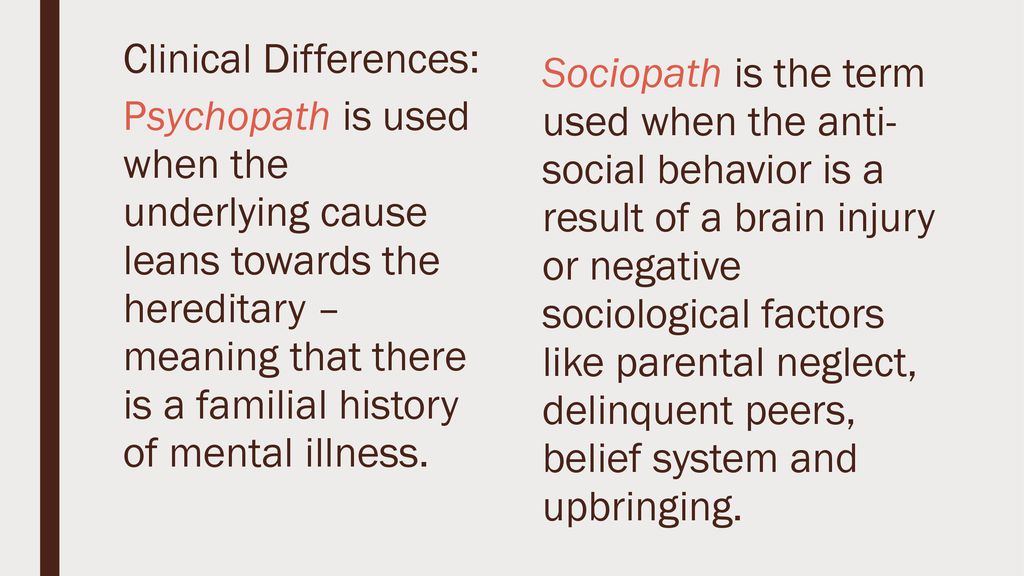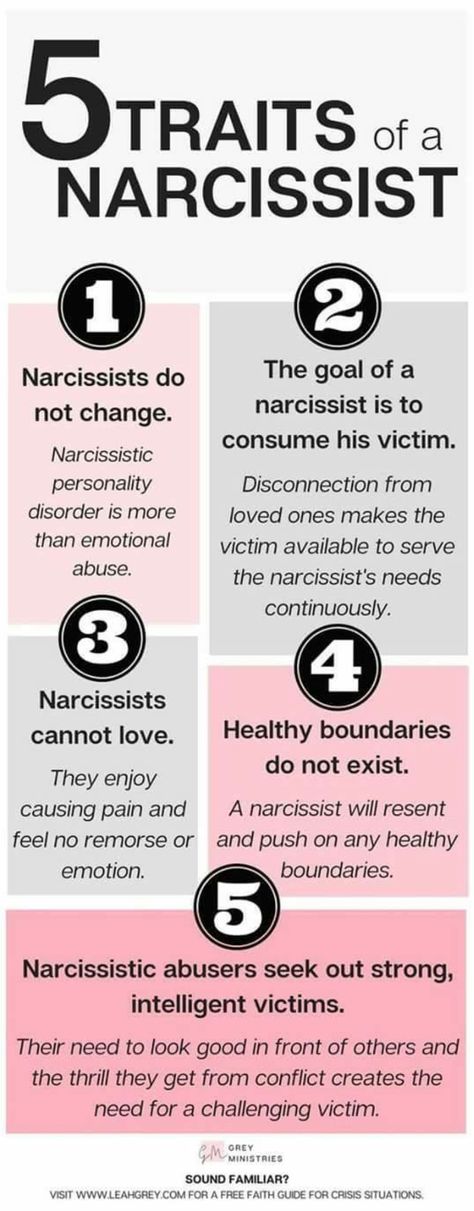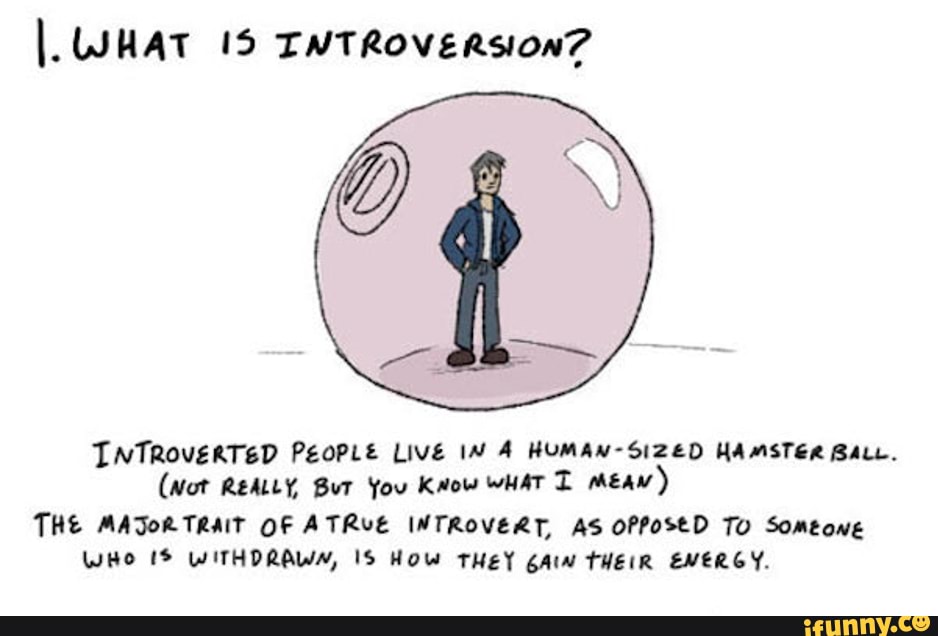Can sociopaths change
Sociopath Treatment: Can a Sociopath Change?
Tanya J. Peterson
Is there treatment for sociopaths? Is it possible for the sociopath to change? While terms such as sociopath and psychopath are frequently used by the general public as well as professionals, the technical name for the disorder is antisocial personality disorder.
As a personality disorder, sociopathy is pervasive; it impacts every facet of someone's life. It's also consistent and stable over time. The biological seeds are present in the brain of a sociopath from birth, and they're nurtured by people and events in the childhood environment. Given the depth and nature of sociopathy, are there effective treatments to help the sociopath change?
Sociopath Treatments That Don't Work
A fairly common conception in society is that the sociopath has been indulged and spoiled (Sociopath Causes: The Making of a Sociopath). For a sociopath to change, it's reasoned that people must stop enabling him. A dose of reality packaged in a container of tough love, without the packing peanuts to cushion it, will certainly cure a sociopath. Right? Unfortunately, this thinking is too simplistic and such an approach is doomed to failure.
Not wanting to give up on the sociopath, professionals have attempted many other sociopath treatment approaches.
- Punishment, including prison. After repeated failures with punishment, experts have learned that punishment is a very ineffective sociopath treatment. Sociopaths are unable to learn from either mistakes or punishments. They're unable, and they don't care. Punishment doesn't affect them in the least. They go after what they want, and they aren't concerned for the consequences. They have no fear and no remorse, so punishment is lost on the sociopath. If anything, punishment simply provides the excitement of a new opportunity, new people to exploit.
- Therapy/counseling. Research shows that at best, therapy is a useless sociopath treatment.
 It requires collaboration between client and therapist as well as a desire for changes. Sociopaths don't want to change, and they are unwilling to work with someone if it doesn't benefit them. At worst, therapy can actually worsen sociopathic behavior because it's a new game for the sociopath.
It requires collaboration between client and therapist as well as a desire for changes. Sociopaths don't want to change, and they are unwilling to work with someone if it doesn't benefit them. At worst, therapy can actually worsen sociopathic behavior because it's a new game for the sociopath. - Medication. Currently, no medication exists to treat sociopathy. It's a personality disorder rather than an illness.
- Threats and pleas. Threatening, pleading with, or offering rewards to a sociopath gives him another point in his game. If he can get people to react in this way, he scores. He's ready to keep playing. Threats during a relationship with a sociopath don't work as a sociopath treatment, but they do encourage him to keep doing what he's doing.
- Teaching empathy and emotion. Trying to teach empathy and emotion to a sociopath is like trying to teach a cellphone to cook a pizza. If it sounds ridiculous to teach a phone to cook a pizza, it's because it is.
 A phone isn't wired to cook, and it's not bothered by this fact. Likewise, a sociopath's brain isn't wired to feel empathy or other emotions, and like the phone, the sociopath isn't bothered about it.
A phone isn't wired to cook, and it's not bothered by this fact. Likewise, a sociopath's brain isn't wired to feel empathy or other emotions, and like the phone, the sociopath isn't bothered about it.
Sociopath Treatment That Works
- Confronting the problem head-on. Coming to understand the nature and scope of sociopathy, acknowledging that it's complex group of traits and behaviors that function together, and dealing with the whole rather than with little parts of it is a helpful start. Changing one aspect of a sociopath, such as trying to help her stop lying, does nothing to change the nature of a sociopath.
- Adopting a systemic approach. Sociopath treatment has a better chance of working if it's done in every system in which the sociopath functions (relationships, work, activities, etc.). Evidence shows that working with sociopaths in the field is somewhat effective in changing attitudes and behaviors. Unfortunately, evidence also shows that after initial improvement, the sociopath regresses back to his old self.

While these treatments may not be effective for adult sociopaths, they may prove helpful to the child sociopath - one who exhibits sociopathic behaviors in childhood.
When Treatment For Sociopaths Fails
The unfortunate reality is that at this point, there is no evidence to show that a sociopath can change. Currently, there is nothing that has been proven effective as a treatment for a sociopath. Researchers and practitioners aren't giving up, though. Can sociopaths be cured? Experts hope they can.
In the meantime, professionals advise that the best way to deal with a sociopath is to cut off all contact. Doing so may be the best treatment possible, at least for the non-sociopath.
article references
APA Reference
Peterson, T. (2021, December 17). Sociopath Treatment: Can a Sociopath Change?, HealthyPlace. Retrieved on 2023, February 18 from https://www.healthyplace.com/personality-disorders/sociopath/sociopath-treatment-can-a-sociopath-change
Last Updated: January 28, 2022
Medically reviewed by Harry Croft, MD
More Info
Narcissistic Personality Disorder (NPD) Definition
Paranoid Personality Disorder Symptoms, Diagnosis
What Is Paranoid Personality Disorder?
The Ghost in the Machine (Narcissism and Rootlessness)
Video: Recovering From A Relationship With A Narcissist
Dependent Personality Disorder Articles
Famous People with Antisocial Personality Disorder
Can the sociopath change? | Dating a Sociopath
The one question that is often asked when you find out that the person you are in love with is a sociopath, is:
The short answer is NO.
It is important that we get the short answer of No, out of the way as quickly as possible. No they cannot change. Currently there is no cure or therapy for sociopathy that has been found to work effectively. In fact, therapy, couples counselling etc, can make things worse, as the sociopath learns to sharpen their tools to manipulate. It can make them more manipulative. If the sociopath is begging for another chance, and promising that he will change, he is, quite simply, lying.
The reason why they cannot change, is because they lack conscience. Which means that they feel no guilt, no remorse or shame for their actions. Not only this, but because of this, they are unable to learn from past experiences. A sociopath is unable to make future realistic plans in life, and is not goal orientated or focused.
- Lack of conscience
- Lack of genuine feelings
- Inability to feel remorse or shame for past actions
- Unable to learn from past experiences
- Lack of life plan and inability to make target focused goals to create a life plan
A sociopath might feign sorrow or apologies. And you, as the victim, after all of the hurt and pain you have been through, might feel relieved. This is what you have wanted to hear. You just want anormal relationship, with someone who doesn’t lie, cheat, betray and use you.
And you, as the victim, after all of the hurt and pain you have been through, might feel relieved. This is what you have wanted to hear. You just want anormal relationship, with someone who doesn’t lie, cheat, betray and use you.
You reason that if a person feels sorrow for their actions, that they will learn that they have hurt you and will not repeat those actions again? This is reasonable thought when making judgement about somebody who thinks with an ordinary mind. But it is not reasonable thought when making judgement about a sociopath. A sociopath does not, and cannot feel genuine sorrow (Unless it is sorrow for himself).
They might feel sorry that they have done something which has reduced their source for supply, or that they have lost someone out of their life which is useful to them. But once they have regained your trust, and got their source of supply back, the acting ‘sorrowful’ will be gone.
A sociopath is unable to experience empathy, which means that a sociopath has an inability to feel how anybody else feels apart from himself.
Emotions that he expresses are those that he has learnt from other people, they are not genuine feelings or emotions. Remember that the sociopath is a chameleon, he is quite able to be whatever anybody wants him to be, if it serves his purpose.
Whatever he is doing or saying, to convince you that he has changed, and is now sorry, is simply an ‘act’. He will act out what he thinks that you want to hear. There is nothing genuine about it. And as soon as trust with you is won, he will return to the same person doing the same actions as he did before.
The longer that you stay with it, the more repetitive the behaviour will become. This is because they cannot change. They are manipulative and conning. They love to dupe and deceive you, as they have little else of value in their lives. It gives them a rush of endorphins to do so.
What might be genuine, is that they do not want to lose you out of their life. But this would not be because of love, it would be because you have further supply that they wish to use you for. Quite simply, you are useful to them.
Quite simply, you are useful to them.
If you are in love with a sociopath, and hoping that he will one day change, and that things will get better, you are simply wasting your life. Any change will be temporary. It is an act that the sociopath will find it impossible to keep up.
Whatever it is that he/she has been doing, lying, cheating, stealing, the sociopath will soon (no matter what false promises are made) return to the same pattern of behaviour.
There is unfortunately no hope that this person will change, because they will not and they cannot. You could waste years of your life ‘waiting’. The best outcome that you could wish for, is for you to love unconditionally no matter what they are doing. But this wouldn’t be a good outcome for you, as you would be denying your own needs.
At what point was the sociopath thinking about YOUR needs, YOUR welfare? ….. see? Never at any point. He was always thinking about himself and what he could get from you. Is this all that you are worth? Someone to be used? Now focus this love, onto You! You deserve it…
A sociopath is Wordsworth at words, false words, empty promises. But he isn’t too great at action and following up those words. Which leads to constant disappointment, let down and heartache. So learn to trust you. Learn to take care of yourself. Learn self love. Learn to love the inner you. Because truly, the secret of true happiness lies within.
But he isn’t too great at action and following up those words. Which leads to constant disappointment, let down and heartache. So learn to trust you. Learn to take care of yourself. Learn self love. Learn to love the inner you. Because truly, the secret of true happiness lies within.
Words © datingasociopath.com
Like this:
Like Loading...
Can a sociopath change and why not?
From time to time someone asks if a sociopath can change? And usually it's someone who has a romantic relationship with that person.
In this article
- What is sociopathy?
- How do sociopaths influence non-sociopaths?
- Tactics sociopaths use to get under our skin
- Sociopathy treatment failed and what might work
Someone who hopes to live a normal life with someone they love. Unfortunately, it would be wrong to give you false hope.
Sociopaths don't change.
But let's look at everything there is to know about sociopathy, including a bit of hope.
What is sociopathy?
Sociopathy is currently an abandoned term for this personality disorder in the official diagnostic system.
However, this term alone should no longer be used; the mess is too real. But we will continue to use the term sociopathy because it is understood and used by the general public as well as professionals.
Sociopathy is now called antisocial personality disorder in fifth edition Diagnostic and Statistical Manual of Mental Disorders .
As the name suggests, it is a personality disorder, which means it is pervasive. It is also likely congenital or acquired at an early age, although the exact causes are unknown. And, unlike emotional disorders or addictions, they are really difficult to treat, which we will talk about later.
Briefly, a sociopath is someone who, without any remorse, directly ignores the opinions and rights of others.

They are mostly criminals or live on the edge of the law. Their moral compass is based on their own needs and has nothing to do with society's norms. They are also often offensive as they have no empathy and manipulating people is their idea for entertainment.
How do sociopaths influence non-sociopaths?
Surprisingly, sociopaths are often popular and generally respected.
Until you recognize them.
More precisely, until they let you see your true self. They are usually very socially savvy and can read others like open books. That's why they know exactly what to do to win someone's affection or sympathy. They do it to get what they want.
It is not uncommon for a sociopath to be married and have a family. However, as a rule, this is just a blind due to a completely different mindset than what we expect from a married person. They often become offensive and also very often vindictive.
You can make them angry by buying the wrong coffee. Worst of all, it's very hard to leave when they think you're their toy.
Worst of all, it's very hard to leave when they think you're their toy.
Tactics sociopaths use to get under our skin
Sociopaths are masters of deception. They know exactly how to deceive us. They have a way of making us doubt ourselves and trust them.
First they do this maneuver to gain control over our thoughts and actions. Everything they do, including marriage, has ulterior motives. Be it financial gain or any other bonus, they will lie, cheat, cheat and never reveal their true intentions.
When faced with something they have done, they will use any weapon available to stop them from getting what they want.
Think of Ted Bundy, the man who tried charm, status, intelligence, and when all that didn't work, he just didn't eat to lose weight and escape prison. Only kill again on the same day. And then, when he was finally caught for good, he went back to being the victim and feigning remorse. Fortunately, it didn't work.
Unsuccessful treatment for sociopathy and what might work
More often than not, since the sociopath is also likely to break the law, they will receive some sort of punishment one way or another. But they don't seem to respond well to it, and it's really just a way for society to get them off the street.
Imprisonment will not change the personality structure of the sociopath. It will only teach them new tricks and possibly piss them off even more.
Psychotherapy is also ineffective with sociopaths. This is because in order for psychotherapy to work, the client needs to accept the change that needs to happen. Sociopaths don't want to change. So therapy is usually just another game for them.
Medications are not suitable for treating sociopathy because it is not a disease with specific causes, it is a personality disorder.
What might work since sociopathy is a continuum and there are those who have milder symptoms takes a systematic approach? This means trying to fight sociopathy in all areas, in relationships, at work, among friends and family, and in business.
However, this may be a futile attempt, doomed to failure. Unfortunately, for those associated with a sociopath, it's best to just find a way out.
Share:
6 misconceptions about sociopaths | PSYCHOLOGIES
37,430
Man among menKnow thyself
- Photo
- Unsplash
What is the first thing that comes to mind when mentioning sociopaths? What are they soulless monsters? Most likely, such an impression was deposited in my memory after reading a novel about a maniac, replete with bloody details, but so fascinating that it is impossible to tear myself away. Or that they are insane, like the serial killer Chikatilo or the infamous dictators Adolf Hitler and Mao Zedong? Perhaps not everyone will agree with these statements, but still these are quite typical connotations. So - villains and scoundrels?
The term "sociopath" has become incredibly fashionable today. It is used by everyone who is not lazy, for example, describing a malicious boss or ex-spouse. Although everything is natural: the media so often presented distorted information about sociopathic inclinations that a portrait of a certain monster has developed in society.
It is used by everyone who is not lazy, for example, describing a malicious boss or ex-spouse. Although everything is natural: the media so often presented distorted information about sociopathic inclinations that a portrait of a certain monster has developed in society.
The main delusion
Among the many erroneous opinions, the most confusing is the peculiar “glamorization” of the image. Popular films and television series such as American Psycho and Sherlock played a significant role in this. Their heroes are cold-blooded types, disregarding moral principles, while being rich, powerful and extremely smart.
The combination of problematic anti-social behavior with wealth, fame and power forms a rather attractive type. There is a false impression that people with such deviations have not only a solid state, but also an outstanding intellect. Undoubtedly, this only reinforces the negative connotations and misconceptions that will be discussed.

Myths about sociopaths
1. Sociopathy is incurable
Many people think that sociopathic tendencies and any form of DID cannot be cured. This is not entirely true. Experts say that with the help of properly selected drugs and psychotherapy, impulsive aggression can be reduced.
2. Sociopaths are mentally ill
Sociopathy is not a mental illness and is not the same as psychosis. The condition is not accompanied by symptoms characteristic of psychotics - hallucinations or delusions. The main signs of sociopathy are a lack of empathy and disregard for social norms and rules.
3. Sociopaths are everywhere
Journal articles and statistics often exaggerate the number of sociopaths. In fact, no more than 4% of people on the planet meet the strict criteria. This is not so little, but, in any case, much less than is commonly believed.
4. Sociopaths are so cruel that relationships with them are impossible
Sociopaths really have uncontrolled aggression and a tendency to violence, which is why they are so feared.
However, research shows that this is not always the case. Certainly, sociopathy poses a potential risk of bullying and violence, but people with this personality disorder are generally not violent.
5. Men are more likely to have a sociopath
When a sociopath is mentioned, the imagination usually draws a male portrait. Contrary to popular belief that this pattern of behavior is more common in men than in women, this is not true. Gender does not affect the likelihood of developing this disorder and does not matter in the diagnosis.
6. All successful and powerful people are sociopaths
Undoubtedly, such personalities come across among politicians, businessmen and directors, but, according to statistics, only 1 out of 25 have obvious signs. Attitude towards sociopathy cannot be positive or negative. This is a psychological problem that requires professional intervention.
Why you shouldn't be labeled a "sociopath"
Even if a person is individualistic, egocentric, indifferent and unprincipled, this does not mean that he can be labeled a "sociopath".
Let's leave this task to psychiatrists.
Of course, antisocial behavior, and dissociative personality disorder in particular, should not be taken lightly. It is wise and logical to stay away from those who display such tendencies. At the same time, excessive demonization of the problem not only prevents people with a mental disorder from seeking help, but also fuels unreasonable fear.
Martha Stout, The Sociopath Next Door. People without conscience against us"
Cold and calculating, unpredictable and incredibly attractive is how clinical psychologist Martha Stout describes sociopaths, people without a conscience. Each of us can become a victim of these virtuoso manipulators, succumbing to their predatory charm. Feeling no emotion and no compassion, a sociopath destroys the fate of the people around him, using them to achieve his own selfish goals. The book explains how to recognize such people in time and protect yourself.















